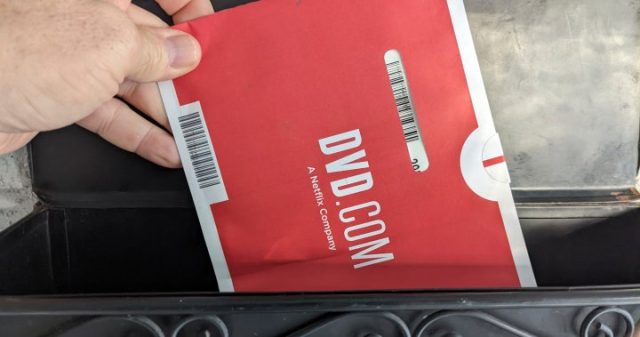Netflix is poised to shut down the DVD-by-mail rental service that set the stage for its trailblazing video streaming service, ending an era that began a quarter century ago when delivering discs through the mail was considered a revolutionary concept.
The DVD service, which still delivers films and TV shows in the red-and-white envelopes that once served as Netflix’s emblem, plans to mail its final discs on Sept. 29.
Netflix ended last year with nearly 231 million worldwide subscribers to its video streaming service, but it stopped disclosing how many people still pay for DVD-by-mail delivery years ago as that part of its business steadily shrank. The DVD service generated US$145.7 million in revenue last year, which translated into somewhere between 1.1 million and 1.3 million subscribers, based on the average prices paid by customers.
Shortly before Netflix broke it off from video streaming in 2011, the DVD-by-mail service boasted more than 16 million subscribers. That number has steadily dwindled and the service’s eventual demise became apparent as the idea of waiting for the U.S. Postal Service to deliver entertainment became woefully outdated.
But the DVD-by-mail service still has die-hard fans who continue to subscribe because they treasure finding obscure movies that are aren’t widely available on video streaming. Many subscribers still wax nostalgic about opening their mailbox and seeing the familiar red-and-white envelopes awaiting them instead of junk mail and a stack of bills.
“Those iconic red envelopes changed the way people watched shows and movies at home — and they paved the way for the shift to streaming,” Netflix co-CEO Ted Sarandos wrote in a blog post about the DVD service’s forthcoming shutdown.

The service’s history dates back to 1997 when Netflix co-founder Marc Randolph went to a post office in Santa Cruz, California, to mail a Patsy Cline compact disc to his friend and fellow co-founder Reed Hasting. Randolph, Netflix’s original CEO, wanted to test whether a disc could be delivered through the U.S. Postal Service without being damaged, hoping eventually to do the same thing with the still-new format that became the DVD.
The Patsy Cline CD arrived at Hastings’ home unblemished, prompting the duo in 1998 to launch a DVD-by-mail rental website that they always knew would be supplanted by even more convenient technology.
“It was planned obsolescence, but our bet was that it would take longer for it to happen than most people thought at the time,” Randolph said in an interview with The Associated Press last year across the street from the Santa Cruz post office where he mailed the Patsy Cline CD. Hastings replaced Randolph as Netflix’s CEO a few years after its inception, a job he didn’t relinquish until stepping down in January.
With just a little over five months of life remaining, the DVD service has shipped more than 5 billion discs across the U.S. — the only country it ever operated. Its ending echoes the downfall of the thousands of Blockbuster video rental stores that closed because they couldn’t counter the threat posed by Netflix’s DVD-by-mail alternative.
Even subscribers who remain loyal to the DVD service could see the end coming as they noticed the shrinking selection in a library that once boasted more than 100,000 titles. Some customers also have reported having to wait longer for discs to be delivered as Netflix closed dozens of DVD distribution centers with the shift to streaming.
“Our goal has always been to provide the best service for our members but as the business continues to shrink that’s going to become increasingly difficult,” Sarandos acknowledged in his blog post.
Netflix rebranded the rental service as DVD.com — a prosaic name that was settled upon after Hastings floated the idea of calling it Qwikster, an idea that was widely ridiculed. The DVD service has been operating from a non-descript office in Fremont, California, located about 20 miles (32 kilometers) from Netflix’s sleek campus in Los Gatos, California.

© 2023 The Canadian Press




















